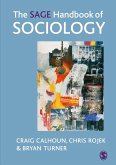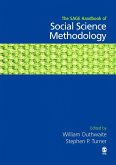'This is an excellent collection of papers which celebrates the best of traditional approaches to fieldwork, whilst also looking to its future. The Handbook will quickly become essential reading for the novice and experienced fieldworker across many of the social sciences' - Chris Pole, University of Leicester
Fieldwork is widely practiced but little written about, yet accounts of the exotic, mundane, complex and often dangerous are central to not only sociology and anthropology but also geography, social psychology and criminology. In all these - increasingly overlapping - fields, experience underlies any comprehensive understanding of social life.
The SAGE Handbook of Fieldwork presents the first major overview of this method in all its variety, introducing the reader to the strengths, weaknesses, and 'real world' applications of fieldwork techniques. Its 22 carefully chosen chapters are each based on a substantive field of empirical enquiry, written by an acknowledged expert in the field. The range is impressive: from the traditional to the virtual, concerning subjects as diverse as emotion, sexuality, sport, embodiment, identity, self-narrative, fieldwork in organizations, science and technology.
Specifically intended for use in undergraduate and postgraduate courses in qualitative research design and methodology in sociology, anthropology, criminology, urban studies, social geography, public health and education, the handbook will also prove beneficial to academic researchers in these and other disciplines.
Fieldwork is widely practiced but little written about, yet accounts of the exotic, mundane, complex and often dangerous are central to not only sociology and anthropology but also geography, social psychology and criminology. In all these - increasingly overlapping - fields, experience underlies any comprehensive understanding of social life.
The SAGE Handbook of Fieldwork presents the first major overview of this method in all its variety, introducing the reader to the strengths, weaknesses, and 'real world' applications of fieldwork techniques. Its 22 carefully chosen chapters are each based on a substantive field of empirical enquiry, written by an acknowledged expert in the field. The range is impressive: from the traditional to the virtual, concerning subjects as diverse as emotion, sexuality, sport, embodiment, identity, self-narrative, fieldwork in organizations, science and technology.
Specifically intended for use in undergraduate and postgraduate courses in qualitative research design and methodology in sociology, anthropology, criminology, urban studies, social geography, public health and education, the handbook will also prove beneficial to academic researchers in these and other disciplines.
Dieser Download kann aus rechtlichen Gründen nur mit Rechnungsadresse in A, D ausgeliefert werden.









